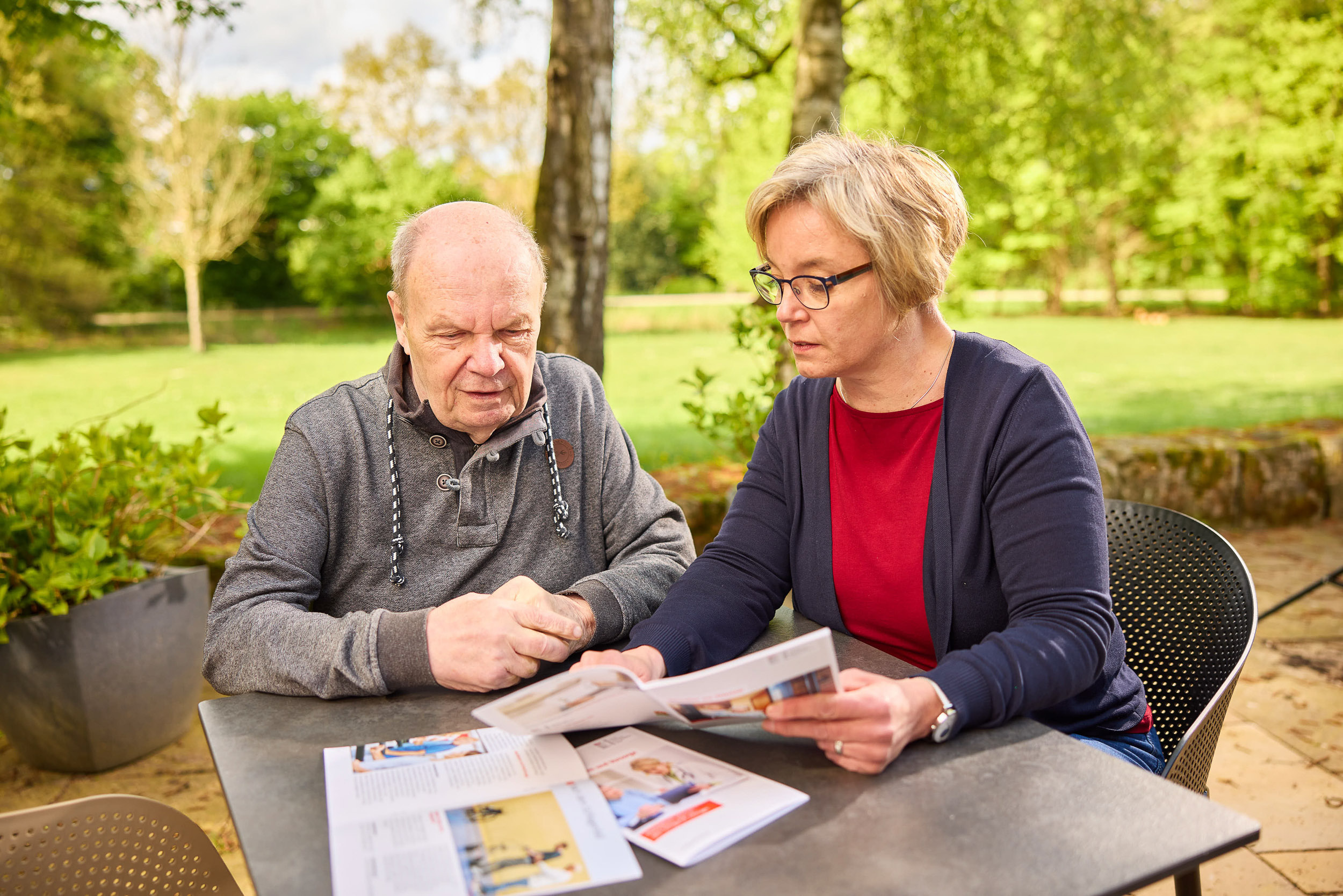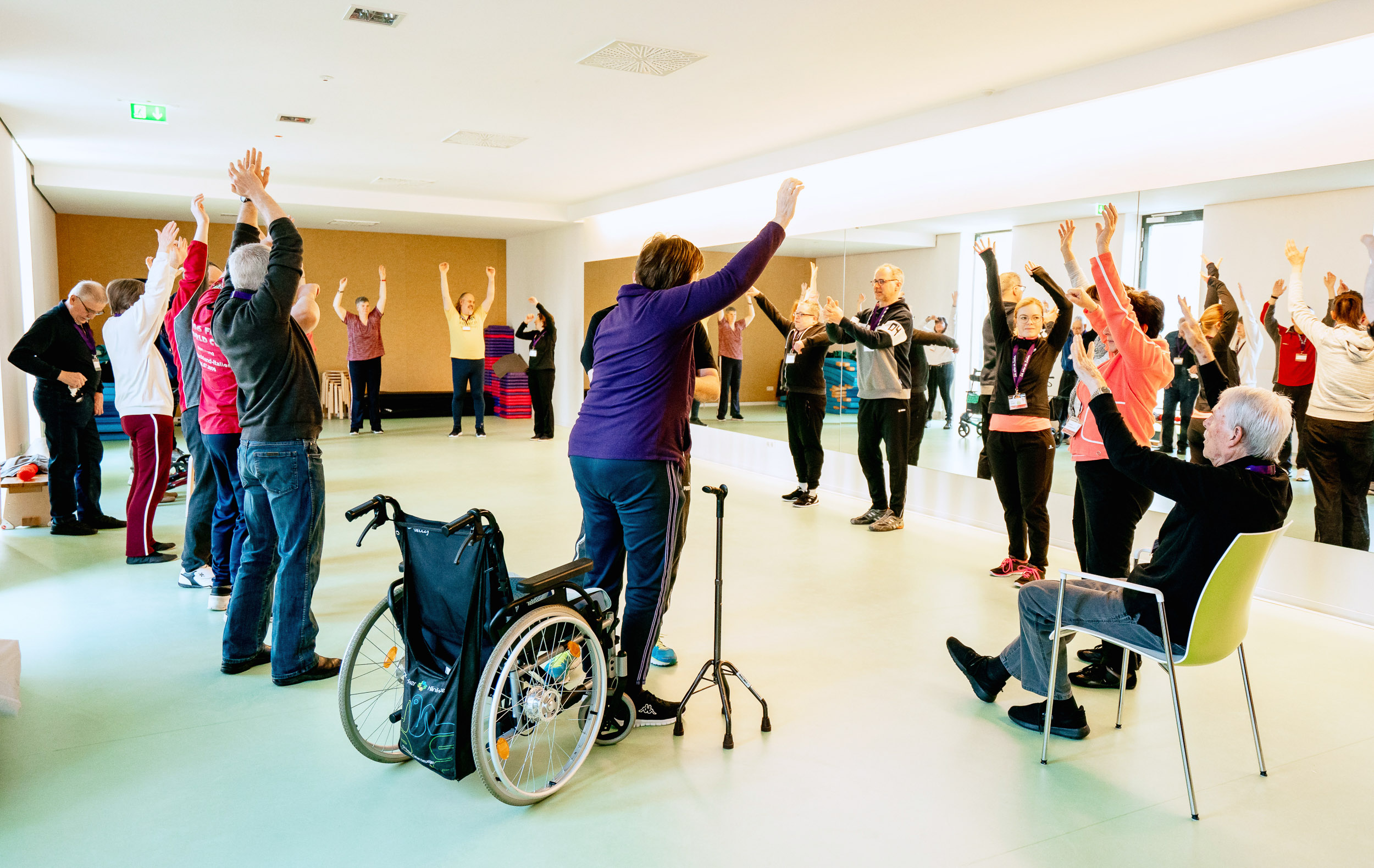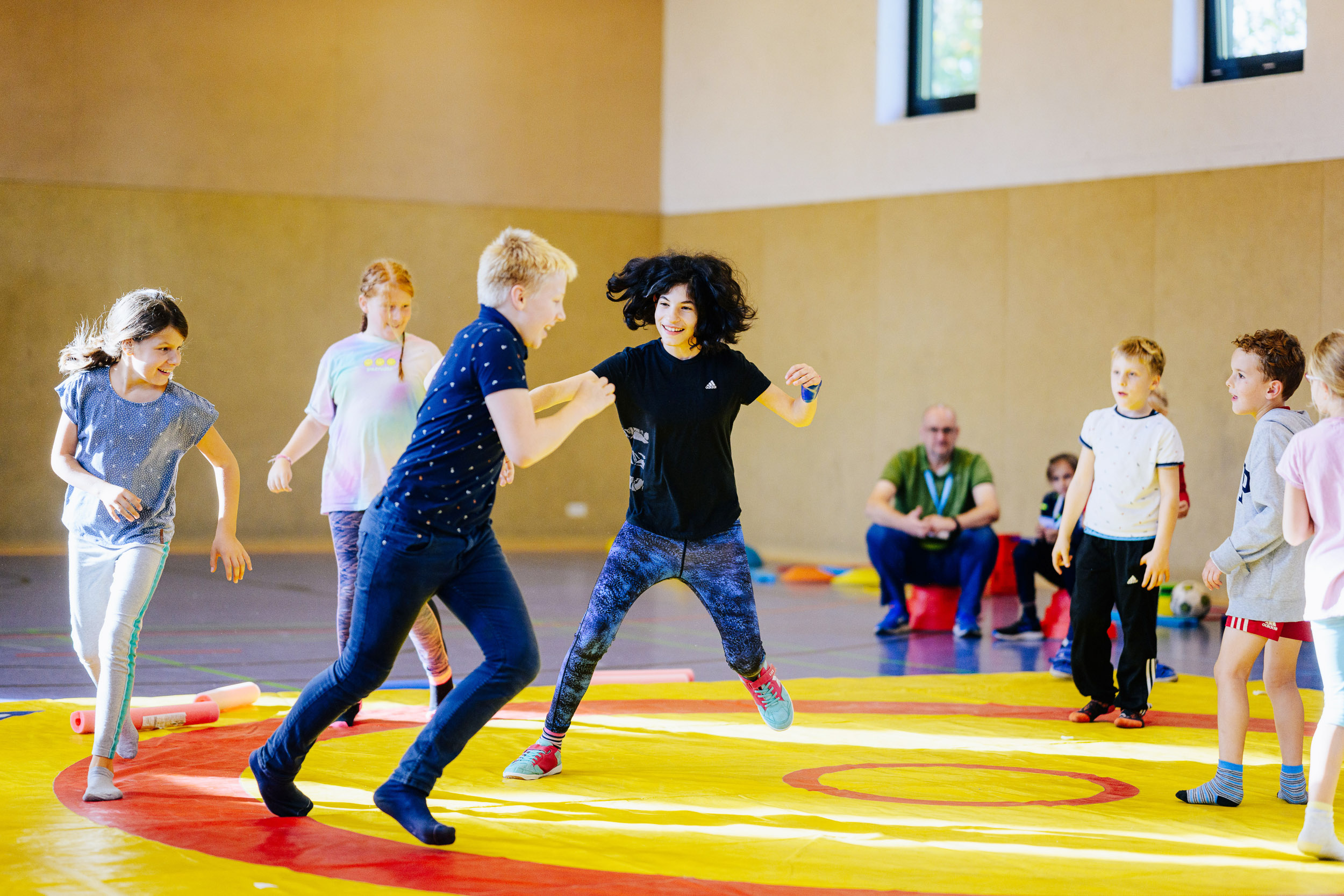
THERAPY Magazin
Together for people – against stroke
Discover how the German Stroke Foundation helps prevent strokes and improve aftercare – from stroke guides to self-help groups and education. Learn more and get involved.

Dr. Michael Brinkmeier
Chairman of the Board, German Stroke Foundation
Prevention, acute care and aftercare for a healthy life
Since its establishment by Liz Mohn in 1993, the Stiftung Deutsche Schlaganfall-Hilfe (German Stroke Foundation) has pursued the goal of preventing strokes and counteracting the consequences of this condition. From prevention and health promotion to emergency management and acute care through to rehabilitation and aftercare, the Foundation is involved in all areas.
Almost 270,000 people in Germany suffer a stroke every year.
Every year, almost 270,000 people in Germany suffer a stroke, almost 200,000 of which are first-time strokes. Strengthening acute therapy was therefore one of the Foundation’s first milestones after it was established over 30 years ago. Today, there are more than 350 specialised stroke units in Germany, which are certified by the Foundation and the German Stroke Society in order to promote their quality. As a result, almost twice as many patients survive strokes today than 30 years ago. The German Stroke Foundation aims to achieve further improvements for those affected by regularly contributing to medical guidelines from the acute and aftercare sectors. The Foundation is therefore also keen to engage in dialogue with various stakeholders in the healthcare system, such as therapeutic and medical professionals. It is also present at trade fairs such as OTWorld.

Improving aftercare
The German Stroke Foundation sees potential for improvement above all in the area of aftercare. Improving aftercare is therefore an important goal for the coming years. To achieve this, the Foundation has launched innovative pilot projects, including the introduction of stroke guides. Stroke guides accompany those affected as they make their way back to everyday life for a year after the stroke. Their aim is to improve the independence and quality of life of those affected. To this end, they coordinate treatments by doctors and therapists, promote adherence to therapy and provide support with everyday questions, for example about social benefits or other care services. The aim of the Foundation is for the stroke guides to become part of standard care in the future. This year, the German Stroke Foundation launched the LEX LOTSEN OWL project, which is subsidised by the Innovation Fund, in order to test how the transfer to standard care can succeed.
The German Stroke Foundation sees potential for improvement above all in the area of aftercare. Improving aftercare is therefore an important goal for the coming years. To achieve this, the Foundation has launched innovative pilot projects, including the introduction of stroke guides. Stroke guides accompany those affected as they make their way back to everyday life for a year after the stroke. Their aim is to improve the independence and quality of life of those affected. To this end, they coordinate treatments by doctors and therapists, promote adherence to therapy and provide support with everyday questions, for example about social benefits or other care services. The aim of the Foundation is for the stroke guides to become part of standard care in the future. This year, the German Stroke Foundation launched the LEX LOTSEN OWL project, which is subsidised by the Innovation Fund, in order to test how the transfer to standard care can succeed.
Strong voluntary work
But the stroke guides are not the only aftercare project run by the Foundation. Because those affected and their relatives often feel overwhelmed during aftercare, the German Stroke Foundation has launched the concept of volunteer stroke helpers. They provide support in everyday life. The Foundation has already trained more than 600 stroke helpers throughout Germany. It also promotes self-help groups by providing organisational support during the start-up phase, training opportunities for group spokespersons and financial support. Around 350 stroke self-help groups have already been set up under the umbrella of the Foundation. It is supported in its work by around 190 regional representatives, mostly doctors from clinics and rehabilitation centres. They work for the Foundation on a voluntary basis and pass on their expert knowledge in lectures, for example.
But the stroke guides are not the only aftercare project run by the Foundation. Because those affected and their relatives often feel overwhelmed during aftercare, the German Stroke Foundation has launched the concept of volunteer stroke helpers. They provide support in everyday life. The Foundation has already trained more than 600 stroke helpers throughout Germany. It also promotes self-help groups by providing organisational support during the start-up phase, training opportunities for group spokespersons and financial support. Around 350 stroke self-help groups have already been set up under the umbrella of the Foundation. It is supported in its work by around 190 regional representatives, mostly doctors from clinics and rehabilitation centres. They work for the Foundation on a voluntary basis and pass on their expert knowledge in lectures, for example.
Living a self-determined life again
Therapists are important contacts for people who have suffered a stroke. They are “up close and personal” and provide valuable tips on returning to life. The same applies to the provision of medical aids. The right aids make everyday life easier for people who have suffered a stroke. Intensive counselling is necessary to ensure that the aids are precisely tailored to individual needs. The German Stroke Foundation qualifies medical supply stores to provide optimal, individualised care for those affected. Rehabilitation sport has many benefits for people who have suffered a stroke: here they can improve their endurance, strength, coordination and flexibility in a group of people with similar experiences. With the SPORTnachSCHLAG model project, the Foundation therefore supports sports clubs in the model state of North Rhine-Westphalia financially and with advice on setting up new rehabilitation sports groups for those affected.
Therapists are important contacts for people who have suffered a stroke. They are “up close and personal” and provide valuable tips on returning to life. The same applies to the provision of medical aids. The right aids make everyday life easier for people who have suffered a stroke. Intensive counselling is necessary to ensure that the aids are precisely tailored to individual needs. The German Stroke Foundation qualifies medical supply stores to provide optimal, individualised care for those affected. Rehabilitation sport has many benefits for people who have suffered a stroke: here they can improve their endurance, strength, coordination and flexibility in a group of people with similar experiences. With the SPORTnachSCHLAG model project, the Foundation therefore supports sports clubs in the model state of North Rhine-Westphalia financially and with advice on setting up new rehabilitation sports groups for those affected.

Stroke counsellingl
The German Stroke Foundation sees itself as the number one point of contact for those affected and their relatives. Its service and advice centre is available free of charge to answer any questions you may have about strokes. In addition to information on rehabilitation measures and aids, the team also provides advice on everyday problems. In cooperation with the Foundation, 30 regional offices throughout Germany also offer a point of contact for those affected. They know their region inside out when it comes to stroke care.
The German Stroke Foundation sees itself as the number one point of contact for those affected and their relatives. Its service and advice centre is available free of charge to answer any questions you may have about strokes. In addition to information on rehabilitation measures and aids, the team also provides advice on everyday problems. In cooperation with the Foundation, 30 regional offices throughout Germany also offer a point of contact for those affected. They know their region inside out when it comes to stroke care.
Help for all age groups
A stroke can affect anyone. Age is the biggest risk factor here: 80 per cent of those affected are over 60 years old. But strokes also affect around 30,000 people under the age of 55 every year. As the needs of different age groups differ, the German Stroke Foundation offers separate series of events for younger and older people affected by stroke. Few people realise that children can also have strokes, even unborn babies in the womb. Several hundred cases are reported in Germany every year, but the number of unreported cases is much higher, as many childhood strokes remain unrecognised. The Foundation does not leave the often very burdened, affected families alone and supports them with parent seminars, summer camps and child stroke counsellors.
A stroke can affect anyone. Age is the biggest risk factor here: 80 per cent of those affected are over 60 years old. But strokes also affect around 30,000 people under the age of 55 every year. As the needs of different age groups differ, the German Stroke Foundation offers separate series of events for younger and older people affected by stroke. Few people realise that children can also have strokes, even unborn babies in the womb. Several hundred cases are reported in Germany every year, but the number of unreported cases is much higher, as many childhood strokes remain unrecognised. The Foundation does not leave the often very burdened, affected families alone and supports them with parent seminars, summer camps and child stroke counsellors.
Preventing strokes
In addition to its commitment to those affected and their relatives, the German Stroke Foundation also sees itself as a driving force in education and prevention work. At events, in the media and at www.schlaganfall-hilfe.de, it provides information about the causes and symptoms of strokes and the correct behaviour in an emergency. The FAST test app helps you to quickly and easily check whether stroke symptoms are present in an emergency. The Foundation’s “online risk test” allows anyone interested to determine their personal risk profile at any time and free of charge. And for companies, the Foundation offers a “risk check”: in just 15 minutes, employees are informed about the lifestyle-related risk factors for cardiovascular disease and prevention options by means of a personal risk test.
In addition to its commitment to those affected and their relatives, the German Stroke Foundation also sees itself as a driving force in education and prevention work. At events, in the media and at www.schlaganfall-hilfe.de, it provides information about the causes and symptoms of strokes and the correct behaviour in an emergency. The FAST test app helps you to quickly and easily check whether stroke symptoms are present in an emergency. The Foundation’s “online risk test” allows anyone interested to determine their personal risk profile at any time and free of charge. And for companies, the Foundation offers a “risk check”: in just 15 minutes, employees are informed about the lifestyle-related risk factors for cardiovascular disease and prevention options by means of a personal risk test.
More than 600 stroke helpers have already been trained throughout Germany.
2024-2
Audience
Knowledge
Patients & Relatives
Section
Therapy & Practice
THERAPY Magazine
Volume-Issue

Dr. Michael Brinkmeier
Chairman of the Board, German Stroke Foundation
Dr. Michael Brinkmeier earned his Ph.D. in 1996 after studying physics in Paderborn, Göttingen, and Los Angeles, receiving his doctorate in natural sciences (Dr. rer. nat.) at the Max Planck Institute for Biophysical Chemistry in Göttingen under Prof. Eigen. Following this, he worked as a management consultant at McKinsey & Co., Inc. until 2000. From 2000 to 2012, he was a member of the North Rhine-Westphalia state parliament, where he was responsible for science and higher education policy for the CDU parliamentary group. Afterward, he worked as a consultant at Accenture GmbH. Since 2013, he has been the head of the German Stroke Foundation in Gütersloh.
References:
Related contents
Find related exciting contents in our media library.
Mehr laden
This is not what you are searching for? Knowledge
Meet our specialists.
Are you interested in our solutions? Schedule a meeting with a Consultant to talk through your strategy and understand how TEHRA-Trainer can help you to advance rehabilitation.
You need to load content from reCAPTCHA to submit the form. Please note that doing so will share data with third-party providers.
More InformationYou are currently viewing a placeholder content from Turnstile. To access the actual content, click the button below. Please note that doing so will share data with third-party providers.
More Information